
Is Kombucha Good For You?
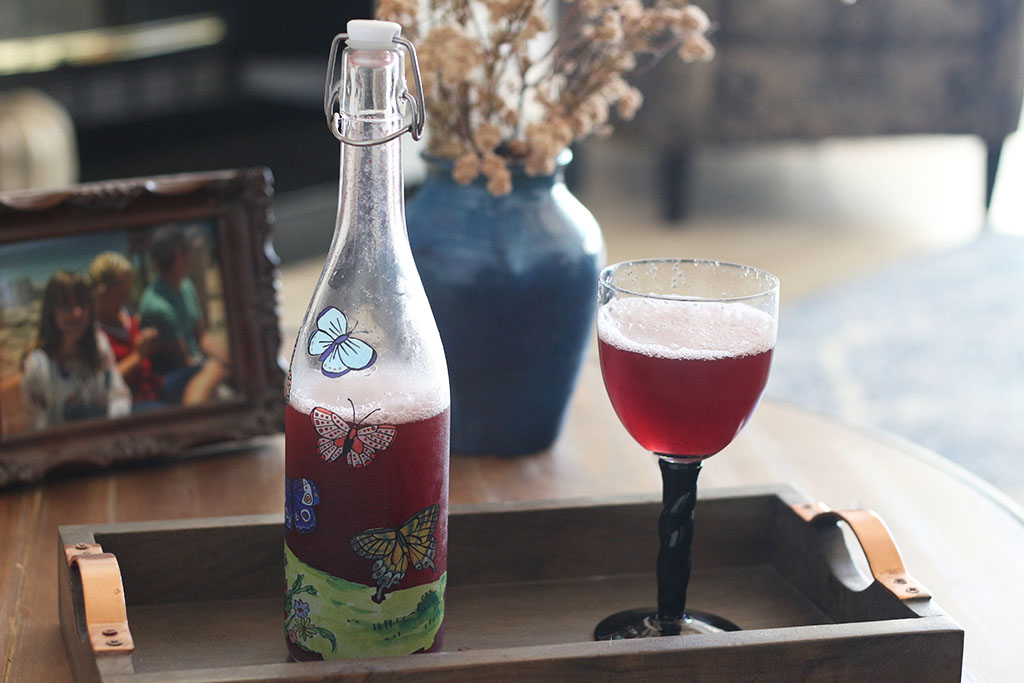
Is kombucha good for you? Is it alcoholic? As of late, kombucha has been getting a lot of press. Kombucha has become a 3.59 billion dollar industry and is expected to reach 11.40 billion by 2030. It is causing quite a stir in the beverage business. Its popularity has grown strictly by word of mouth and is growing at an incredible rate. Even Pepsi is thinking of jumping on the bandwagon and making kombucha as people look for healthy alternatives to pop. It's hard to bring a new product to the beverage industry; the competition is fierce, and many would like it to fail. Kombucha's popularity continues to grow as people find the benefits it brings them. There are controversial articles circulating about kombucha, and that's when I start getting emails from people who don't know who or what to believe. I always shoot straight with you. I don't write sensational blogs about dangerous foods and topics to drive traffic to my site; but the truth is, nobody knows jack diddly about what's right for YOU.
YOU are the wisest person concerning your own diet and what food and drinks you should consume, and not me or anybody else. We have lost our way in all this, and stopped trusting and looking for our own guidance. Honestly, I don't know how we even decide what to eat anymore! They've demonized everything, for goodness sakes! Everyone has a different idea about what's right and it's getting worse by the day. I'm going to give you my opinion about kombucha and my years of experience with it, but I encourage you to test it out on your own body and make your own decisions.
"Nobody can give you wiser advice than yourself."
Marcus Tullius Cicero
Kombucha Questions And Benefits
I stopped drinking kombucha for three months
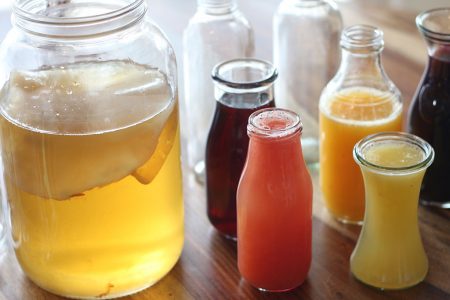
Check out this article:
Is kombucha alcoholic?
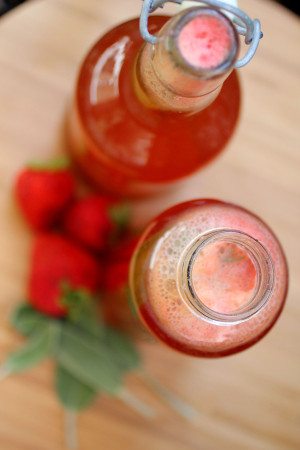
Those who say that kombucha is alcoholic don't understand the fermentation process or the science behind kombucha. I have had several people on my forum who have tested their alcohol levels with a breathalyzer and came up with zero alcohol, and many others found the same results. One person drank a gallon of kombucha in a sitting, and he, too, found nothing really registered on his breathalyzer, but then found he was detoxing like crazy since he wasn't very healthy to begin with. I don't recommend trying this! You'll be in the bathroom — believe me!
Here is my take on all this. Kombucha, like other fermented foods, can have a small bit of alcohol when you second ferment it with fruit juice. Since fermentation is required to make kombucha, the drink generally includes a trace amount of alcohol, but so does yogurt and other foods. Even orange juice has alcohol. About two ounces of juice is usually used to second ferment kombucha. While it ferments, it can create a little bit of alcohol, but then, as it continues to ferment, it subsides. And given a long enough fermentation cycle, kombucha turns to vinegar. The sugars in kombucha, and this goes for Kefir soda too, are reduced by 85% in about four days. The longer it ferments, the less you have. Kefir soda and kombucha do about the same thing when it comes to fermentation and reducing the sugars. Those microbes hungrily eat the sugars and make you a bubbly fruit-flavored drink that is full of vitamins and probiotics.
I think that often times the organic acids and naturally occurring sedimentation is confused for ethanol. Let me explain more about this.
Confusing organic acids and naturally-occurring sedimentation for ethanol
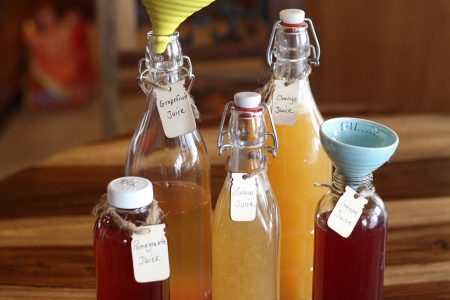
Calories in kombucha
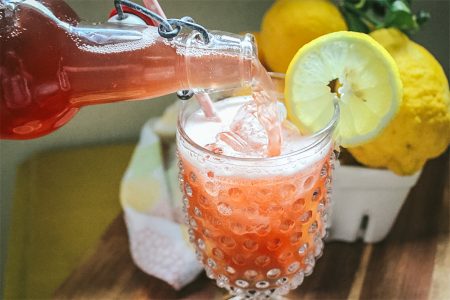
Much of the sugar gets eaten up by the bacteria when you ferment it, so it all depends on several variable factors:
- Length of time you let your kombucha ferment
- Strength and the amount of starter culture
- The room temperature
The longer you ferment, the stronger your starter culture is and the less sugar you will have. If you add more starter culture and your room temperature is hotter, it is going to cause the bacteria to eat up the sugar faster. That's why cultured foods generally have a tart/sour taste . . . because the sugar has been eaten up.
For kombucha, we don't have the conversion precisely, but it's around three to four carbs for the plain versions and seven to ten carbs per 8-ounce glass of the fruit-flavored versions. It really depends on how long you ferment it and if you second ferment it with fruit juice. Remember, as I stated above, 85% of the sugars are consumed in 4 days of fermentation. The sugar is not for you but for the hungry microbes.
Kombucha Benefits
Kombucha has a powerful probiotic: This is actually a probiotic yeast called Saccharomyces boulardii (S. boulardii). We need good yeasts as well as good bacteria to keep our microbiome in balance. S. boulardii is unrelated to the yeast Candida albicans and other Candida species, and is one of the most researched probiotics. It is the number one probiotic used in hospitals worldwide. S. boulardii is absent from the natural gut since it is a transient yeast that passes through the intestines after ingestion. If taken every day, it achieves a steady stream in the colon within three days and is cleared from the stools two to five days later.1 It does not attach to the mucosal cell lining, but works its magic on you as it moves through the gastrointestinal tract. When S. boulardii is present, it inhibits toxins from binding to intestinal receptors and steals the metabolites it needs to survive. Thus, many pathogens pass out of the body unable to survive in the presence of this powerful probiotic.
Kombucha is antibiotic-resistant: In addition to the good bacteria in kombucha, the special probiotic yeast S. boulardii is resistant to antibiotics. This makes it incredibly useful for maintaining a healthy gut when treating an illness with antibiotics.2
Kombucha protects the stomach lining: It neutralizes toxins produced by harmful pathogens and sends out a signal to the body to reduce inflammation that can lead to a number of negative health outcomes. The probiotic in kombucha (S. boulardii) can also act as a decoy to harmful pathogens. It attracts and binds with the pathogens, keeping them from attaching to the intestinal wall and doing damage.3
Kombucha reduces joint pain: Kombucha contains acetic acid, which not only helps stabilize blood sugar but also contains an analgesic (pain reliever) and anti-arthritic compounds which help remove toxins that may have accumulated in joints causing pain and inflammation. Other compounds in kombucha include Mucoitin sulfate, Heparin, and hyaluronic acid. These help provide lubrication and protection to existing joint tissue.4
Kombucha assists the liver in detoxification: Kombucha is full of glucuronic acid which plays a part in one of the body's most important detoxification processes: glucuronidation, a process in which glucuronic acid binds to toxins and transforms them so they can be easily eliminated by the kidneys. The liver produces this substance naturally, but sometimes the body can’t keep up with the number of pollutants that it comes into contact with. The extra glucuronic acid in kombucha helps make up the difference.5
Kombucha helps your kidneys: Kombucha may help kidneys eliminate environmental pollutants. Every day, your kidneys process about 200 quarts of blood to remove and eliminate chemicals and toxins. Calcium builds up in the blood tissues and can cause calcification throughout the body, which can cause calcification in the kidneys (aka kidney stones). Kombucha has been used to prevent the kidneys from forming kidney stones by helping to purify and remove toxins.6
Kombucha alleviates constipation and diarrhea: The probiotic in kombucha, S. boulardii, is actually being used to treat all sorts of bowel disorders including Clostridium difficile, acute diarrhea, antibiotic-associated diarrhea, some parasitic forms of diarrhea, and other gastrointestinal disorders. It also has a record of helping reduce the symptoms of irritable bowel syndrome (IBS). 7,8
Kombucha's preventive effects on heart, weight, cholesterol, and blood glucose. There is a new study on kombucha, published in the Journal of Food and Science.9 The research was carried out to understand the beneficial effects of kombucha on heart, weight, blood glucose, total protein, lipid profile, and cardiac markers in rats with heart damage. They found that kombucha tea significantly decreased cholesterol, triglycerides, LDL and VLDL while increasing the levels of HDL. Similarly, a decrease in leakage of cardiac markers from the myocardium was also observed. When I posted this on my Facebook page, several people commented that their cholesterol levels had gone down, and quite significantly, since they began drinking kombucha.
Where to Find Kombucha
Grocery stores and health food stores sell many different brands of kombucha if you don't want to make it yourself. I do recommend GT's Synergy Kombucha. I don't get anything for saying this but they are one of the few brands that doesn't lightly pasteurize their kombucha, and it's delicious! Generally speaking, commercial kombuchas don't have as many benefits (including probiotics) as homemade kombucha. You'll also have lots of cultures to share with your friends. You just need some tea, sugar, and a starter culture. (which can last a very long time, if not forever, if you take care of it). That's why I recommend that you get a kombucha starter and make it yourself! Plus, it's cheaper to make it in the long run, because you'll have an endless supply of kombucha starters.
If you live in the USA, you can purchase my personal Live Kombucha Starter from my store.
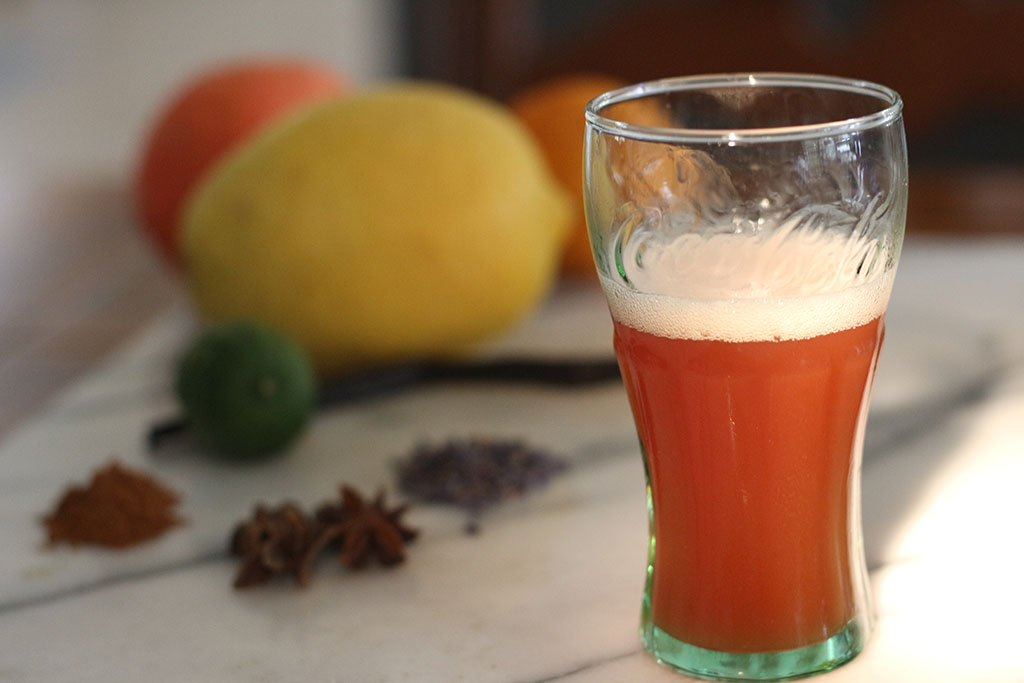
Kombucha is Fun To Make!
Kombucha is fun to make and I can show you how. I encourage you to discover the power that fermented foods can bring to your life. Kombucha has had a tremendous influence on my life and when something like this impacts you, you want to share it. I can literally drink a bottle of kombucha and feel it lift my sense of well-being. That being said, you must trust yourself about the things you eat and drink. Test them and see how you do. Your body is a magnificent machine and takes everything you eat and drink and tries to assimilate it the best way that it can. Discover the things that work best for you and watch your body shine!
I put together some easy instructions on making kombucha. Check it out!
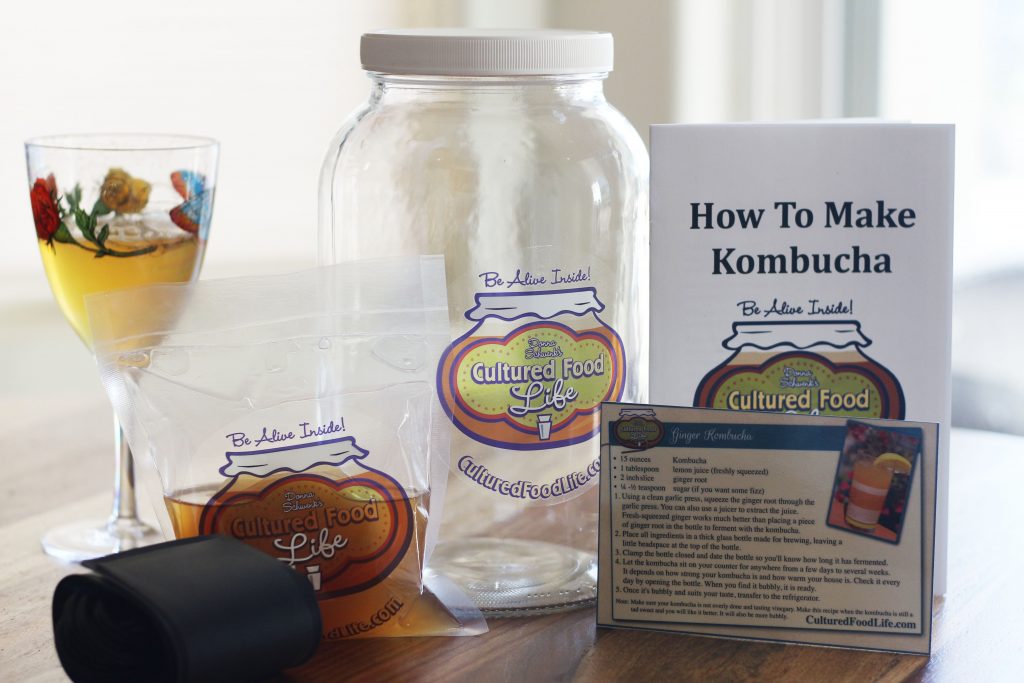
Listen To My Podcast
Kombucha is one of my favorite beverages. It has so many health benefits that you may not know about. Check out the many reasons I drink kombucha and how to easily make it or buy it.
References:
- https://www.ncbi.nlm.nih.gov/pmc/articles/PMC4542552/
- https://www.ncbi.nlm.nih.gov/pmc/articles/PMC3296087/
- https://www.ncbi.nlm.nih.gov/pmc/articles/PMC2868213/
- https://www.ncbi.nlm.nih.gov/pmc/articles/PMC6027349/
- S. Fallon, Nourishing Traditions (Washington, D.C: New Trends Publishing, 1999): 596.
- https://www.sciencedirect.com/science/article/pii/S0963996900000673.
- https://www.ncbi.nlm.nih.gov/pmc/articles/PMC2788564/pdf/1749-8546-4-23.pdf.
- https://www.ncbi.nlm.nih.gov/pubmed/21301358; http://www.ncbi.nlm.nih.gov/pubmed/15288079.
- https://www.ncbi.nlm.nih.gov/pmc/articles/PMC4486530/
Are you on the list?
Sign up today and I'll send you my free Getting Started Guide!
Each week I'll send you updates, tips, recipes, and more! You might even be a winner of my weekly giveaway! (starter cultures, memberships, and more!)
Come be a part of my cultured food family!


